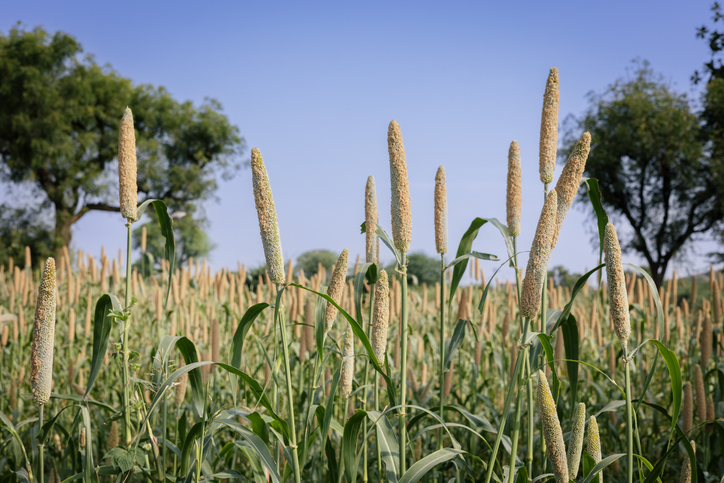The Ministry of Agriculture and Farmers Welfare (MoA&FW) has made remarkable strides in boosting the agricultural sector, with significant progress on multiple fronts aimed at improving the income and livelihood of farmers across India. The department has worked to enhance the production and productivity of various crops, promote agricultural diversification, and provide farmers with the necessary support through a variety of schemes and initiatives.
One of the most notable developments is the unprecedented increase in budget allocation for the agriculture sector. For the fiscal year 2024-25, the government has allocated ₹122,528.77 crore under various welfare programs aimed at empowering farmers. This marks a major step in ensuring the sector receives substantial support for its growth anfd sustainability.
Additionally, record food grain production has been achieved, with the total food grain production for 2023-24 estimated at 332.30 million tonnes. Horticultural production also saw a rise, reaching 352.23 million tonnes.
The Pradhan Mantri Kisan Samman Nidhi (PM-KISAN) scheme continues to offer substantial income support to farmers, transferring ₹6,000 annually in three equal installments to land-holding farmers across the country. Since its launch in 2019, PM-KISAN has emerged as one of the largest Direct Benefit Transfer (DBT) schemes globally, disbursing over ₹3.46 lakh crore to more than 11 crore farmers.
Furthermore, the government has expanded the scope of the Agriculture Infrastructure Fund (AIF), which aims to provide medium to long-term debt financing for post-harvest management and community farming infrastructure. Since its inception in 2020, AIF has sanctioned ₹51,364 crore for over 84,000 projects, including cold storage, processing centers, and other essential agricultural facilities. The scheme is being further enhanced to include measures that will integrate community farming assets and boost infrastructure across the sector.
In its efforts to empower farmers and promote collective farming, the Ministry has launched the Formation and Promotion of 10,000 Farmer Producer Organizations (FPOs). With a budget of ₹6,865 crore until 2027-28, the initiative has already registered over 9,000 FPOs, creating a vital support system for farmers, ensuring better access to markets, and improving their bargaining power.
A key highlight is the government’s initiative to fix the Minimum Support Price (MSP) for several crops, ensuring that farmers receive a price that provides a 50% return on the cost of production. In 2023-24, the MSP for paddy was set at ₹2,300 per quintal, and for wheat, it was raised to ₹2,425 per quintal, securing better returns for farmers.
The government has also introduced the Namo Drone Didi Scheme to provide drones to Women Self Help Groups (SHGs), enabling them to offer services like applying fertilizers and pesticides to farmers. This initiative, with a total allocation of ₹1,261 crore, aims to create sustainable business opportunities for SHGs, with the potential for each group to earn at least ₹1 lakh annually.
In line with its commitment to water conservation and sustainable farming practices, the Per Drop More Crop (PDMC) scheme, which enhances water use efficiency through micro-irrigation technologies, has been extended. Since its launch, the scheme has covered approximately 95 lakh hectares, benefiting millions of farmers by improving water efficiency and crop yields.
The government has also made substantial investments in crop insurance, with over ₹1.70 lakh crore in claims paid under the Pradhan Mantri Fasal Bima Yojana (PMFBY). This scheme provides farmers with financial protection against crop losses due to natural calamities and adverse weather events.
The Digital Agriculture Mission, approved in September 2024, is set to further modernize the agricultural sector. With a ₹2,817 crore budget, the initiative aims to develop Digital Public Infrastructure (DPI) for agriculture, integrating data on farmers, land holdings, and crop types to provide more efficient, data-driven services. It includes the launch of AgriStack, a digital platform that will provide digital IDs to 11 crore farmers and help in the digital crop survey.
In addition to these efforts, the government has been actively promoting natural farming through the National Mission on Natural Farming (NMNF), with an outlay of ₹2,481 crore. The initiative aims to promote environmentally sustainable farming practices and reduce dependency on chemicals.
The government is also focusing on developing agroforestry, which has been incorporated under the Rashtriya Krishi Vikas Yojana (RKVY) to support farmers in planting trees on their farmlands, thus generating additional income while contributing to environmental sustainability. This initiative has seen the planting of millions of trees across the country.
Other initiatives such as the National Beekeeping & Honey Mission, the Mission for Integrated Development of Horticulture, and the National Mission on Edible Oils – Oilseeds (NMEO-Oilseeds) are also in place to further support farmers’ income and ensure food security by enhancing domestic production of edible oils, honey, and horticultural crops.














